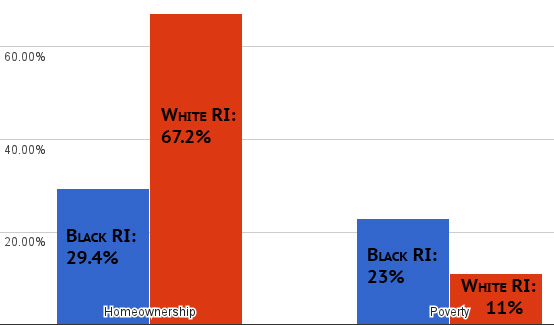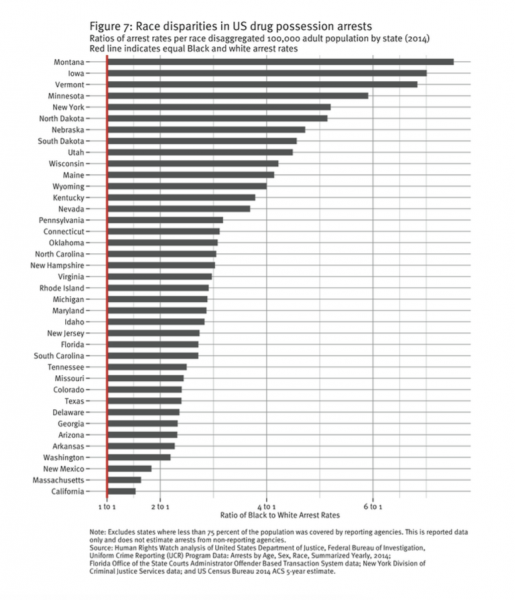 Black Rhode Islanders are almost three times as likely to be arrested for drug charges than white Rhode Islanders, according to a new analysis by the American Civil Liberties Association of Rhode Island.
Black Rhode Islanders are almost three times as likely to be arrested for drug charges than white Rhode Islanders, according to a new analysis by the American Civil Liberties Association of Rhode Island.
“The glaring racial disparities in enforcement of these laws have been going on for too long and must be addressed,” said Steven Brown, executive director of the RI ACLU. “This report is yet another wake-up call about both the overcriminalization of private conduct and the significant racial disparities that permeate our criminal justice system at just about every level.
The report looks at all 50 states done by the ACLU and Human Rights Watch that showed black adults are arrested 2.5 times more often than white adults. In Rhode Island, that ratio is even higher, with 2.9 Black adults arrested for every white adult that is arrested.
Brown said this was “especially troubling” because the report also shows Rhode Island has one of the lowest arrest rates in the nation “per overall population.”
While almost three black Rhode Islanders are arrested for every one white Rhode Islander, there are more than 14 white Rhode Islanders for every one black Rhode Islander. According to the 2010 census, there are 856,000 white Rhode Islanders and only about 60,000 black Rhode Islanders.
Rhode Island has the 21st highest ratio of black-to-white drug arrests in the nation, according to the report. Nearby Vermont has the third highest ratio at 6 to 1 black-to-white drug arrests. Connecticut has the 16th highest average at just over 3 to 1. Massachusetts has the second lowest ratio in the nation at just over 1.5 to 1, second only to California, which is 1.5 to 1.
The national report indicates drugs are the most common reason for arrest made in America and that one of every nine arrests are for drug charges.
“Calling the war on drugs a complete failure that is destroying lives and communities, the report called for decriminalization of personal drug use and possession,” according to a RI ACLU press release. “Instead, the report said, there should be a stronger investment in public health, emphasizing evidence-based prevention; education around the risks of drug use and dependence; and voluntary, affordable treatment and other social services in the community.”
Brown said the new data confirms what the RI ACLU learned when it studied 10 years worth of marijuana arrests in Rhode Island that showed 2.6 to 3.6 black Rhode Islanders were arrested for every white Rhode Islander arrested between 2001 and 2010.
“We hope this report will not only encourage more positive consideration of the marijuana ‘tax and regulate’ bill, but will promote broader efforts by police departments to reconsider how they enforce these particular laws,” said Brown.
Rhode Island continues to take a wait and see approach to legalizing cannabis while Massachusetts voters will decide that question at the ballot this November.

 Treasurer Seth Magaziner has a plan to make corporate board rooms more diverse. Rhode Island’s pension fund will vote against appointing white men to corporate boards of directors that are already comprised of mostly white men.
Treasurer Seth Magaziner has a plan to make corporate board rooms more diverse. Rhode Island’s pension fund will vote against appointing white men to corporate boards of directors that are already comprised of mostly white men.
“Research has shown that diversity leads to better performance. It’s true in government, it’s true in education and its true in the business world as well,” Magaziner said at a news conference today. “Study after study has shown that when you have diverse management teams in corporations those companies perform better, they perform better financially and their stocks perform better. Despite this many corporations are not doing enough to diversify their leadership and it starts at the board level.”
Noting that less than 20 percent of the boards of directors for the S&P index corporations are female and less than 15 percent are people of color, Magaziner said, “This lack of diverse viewpoints hurts these companies, and hurts our pension fund.”
So the state Pension Board approved a new policy to use its proxy votes in the corporations we invests in to vote against appointing white men to boards of directors that have fewer than 30 percent women or racial minorities represented on the boards.
“I believe this will improve our performance and help us financially for the members we serve,” Magaziner said.
The state plans to vote against Hess, Hersheys, ConocoPhillips, Phillips 66 and EMC Corporation, a Massachusetts company, to start. Because it invests in hundreds of companies, there will be hundreds of opportunities to vote against appointing more white men to corporate boards.
“We anticipate that we will be voting against the board slates at a number of large companies because a number of large companies aren’t taking this seriously enough,” Magaziner said. There are no Rhode Island-based companies that the state is voting against yet, but that situation will arise.
Rhode Island doesn’t have large stakes in these businesses, so it can’t block any appointments. But Magaziner said it will send a message.
“There are a number of other large institutional investors who are progressive and who would care about this from an opportunity-building point of view, there are other large state pension funds, there are union funds out there,” he said. “But ideology aside, everyone cares about making good returns. So what we need to do is keep taking about the fact that the research shows that stronger diversity is good for performance. We’re going to keep evangalizing and beating this drum.”
He said Rhode Island won’t divest from companies for appointing too many white men.
“If we were to divest from these companies then the only voting members that would be left would be the ones that don’t care,” he said. “My philosophy is you stay engaged, you keep voting the right way and you recruit other investors to start voting the right way too.”
Jim Vincent, the executive director of the Providence chapter of the NAACP, and Dariah Kreher, chairwoman of the Women’s Fund of Rhode Island, both applauded the move.
“It’s so important to have inclusion on the part of all Americans, not just the precious few that have always been a part of these boards,” Vincent said. “We feel that it is a very important step for Rhode Island to make. To say that you can’t find talented people of color to be on boards and commissions is not only insulting but it is counter-productive to having the best pension fund we can have. So it’s a win, win in the state of Rhode Island today. I look forward to seeing how the companies respond to this bold initiative.”
Kreher said the trend in Europe is for the government to impose quotas on corporate boards of directors. Germany, she said, recently mandated corporate boards become at least 30 percent female, and that similar laws have been passed in Norway, Spain, France, Belgium and Italy and Iceland “The EU is considering a mandate to bring the numbers to 40 percent,” she said.
“Businesses in the United States don’t like mandates,” Kreher said. “But they might not be providing optimum returns for their investments based on the limited talent and the myopic vision of their decision-making bodies. Changes are necessary if the US is to keep up with world economy.”
]]>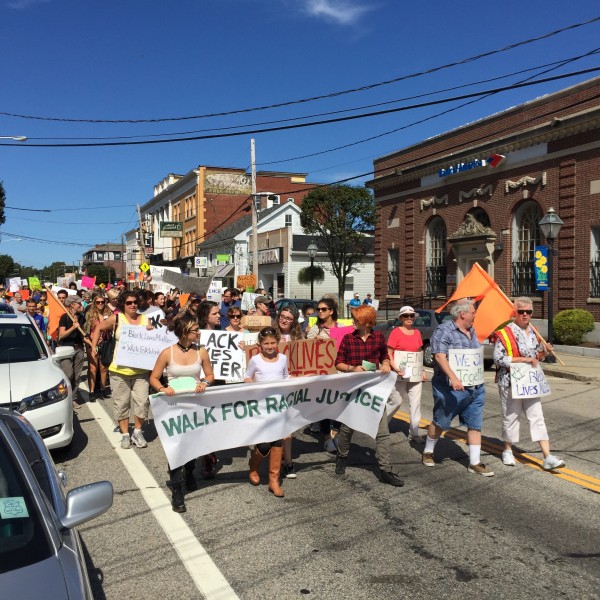
First came the killing of Michael Brown in Ferguson, Missouri, ensuing protests and videos of other unarmed black people around the country dying at the hands of police.
Then came white supremacist flyers delivered to some driveways in East Greenwich in June (“Earth’s most endangered species: the white race”).
Then came Sunday’s March for Racial Justice, which literally made a loop around my East Greenwich neighborhood.
This stuff is getting close to home!
East Greenwich is 92 percent white. That’s pretty pale. It’s easy to feel like we are not racist – maybe because we don’t have any race to bump up against. But if there’s one thing we’ve learned in the past 14 months, racism isn’t just white supremacist flyers. In fact, the most dangerous racism is living in a bubble where you don’t see there’s a problem.
Most of us moved to East Greenwich to live in that bubble, whether we did it overtly or not. We moved for the schools, we moved for the nice neighborhoods … we moved to be removed from the other. That’s the American way, the human way even. But it’s not the best way to live as one nation, united.
So it was good when, on Sunday in East Greenwich, about 200 people – mainly white – gathered at the Westminster Unitarian Church and marched down to Main Street and back (about 2 miles) chanting things like “What will we do for racial justice? Today we speak for racial justice.”
On Main Street. In my town.
Most of the marchers came from other places, but it was great to see many East Greenwich residents. Maybe a quarter of the marchers were from EG. That’s not a triumph. But it is a start.
]]>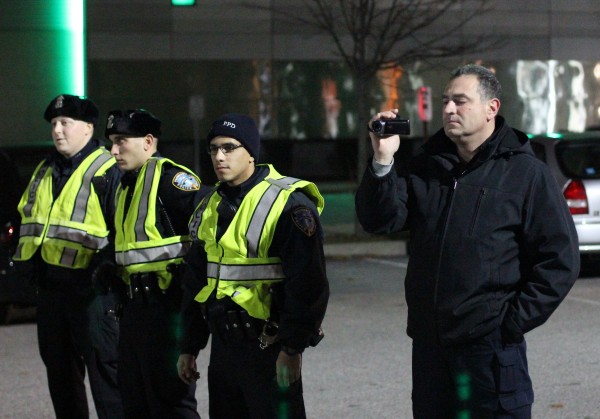 Legislation to help mend the bonds between the police and community after a year of national duress will cross Governor Gina Raimondo’s desk to be signed into law.
Legislation to help mend the bonds between the police and community after a year of national duress will cross Governor Gina Raimondo’s desk to be signed into law.
The bill, known as the Comprehensive Community-Police Relationship act, requires that all police departments collect data on a subject’s race during traffic stops. The information will then be submitted to the Department of Transportation’s Office of Highway Safety, to be put in a yearly report showing what has been done to address any racial disparities. The act also makes illegal “consent searches” of juveniles, unless the officer has probable cause or reason of suspicion.
“It’s more communication between the police, the community, and juveniles,” said Representative Joseph Almeida (D-District 12), the main sponsor of the bill on the House side. “All we’re asking for is more probable cause, and right to be stopped.”
Almeida also said that the act is already helping to build communication between people of color and police.
“Communication is a big issue in civil rights,” he said.
Senator Harold Metts (D-District 6), the bill’s main sponsor on the Senate side, believes that after the events in Baltimore, New York, and Ferguson, communication is more needed now than it ever was before.
“We have to work together,” he said. “Even despite all the tension that’s across the country and across the world, the community and the police have to work together to build trust, because that’s the only way we’re going to have safer communities.”
According to Metts, different groups have met over the past eight months on both sides of the issue to come up with the version of the act that has been passed. Although the legal aspects of the bill concerning racial profiling and traffic stops were certainly important for him, there was something bigger that everyone seemed to miss.
“The important thing that everybody overlooked, for me, was how two opposed parties, initially, got together, and realized that they had to work together to come up with this compromise bill,” he said.
Metts added that the bill is especially important in his district, which is largely comprised of people of color. People have spoken to him about racial profiling and the way it dehumanizes them. Metts himself has been a victim of such profiling.
“Everybody wants to be treated with respect and fairly, on both sides,” he said.
Opponents to this bill, and similar bills all over the country, have argued that making officers take this extra step, or having to fill out more paperwork, is too much work. Representative Almeida, who is a retired police officer, believes otherwise.
“That’s bull,” he said. “That’s not true. Paperwork is good because we were told to form a paper trail. It’s not going to give them any more work. Besides, if you look to the right [in a police cruiser], there’s a computer there. It’s not going to stop anything.”
The specific requirements of the bill are fairly straightforward. Searches conducted by police officers should be documented and include the date, time, location, and probably cause leading up to the search. Those who have been recorded with video or audio equipment have the right to view that footage, provided that it does not compromise the investigation. It also establishes a procedure for searches of juveniles without a warrant. Officers can only ask for the juvenile’s consent if there is probable cause, and if there is, the juvenile has the right to refuse the search.
The collection of this data would begin July 2016, and would be put toward the Office of Highway Safety’s yearly report, as well as a quarterly summary of the monthly information provided by police departments.
]]>]]>
 Legislative leaders offered a glimpse into their plans to address institutional racism in Rhode Island this session when commenting on a new ACLU report that shows often wide racial disparities in school discipline, traffic stops, arrests and prison populations – “the school-to-prison pipeline,” according to the report.
Legislative leaders offered a glimpse into their plans to address institutional racism in Rhode Island this session when commenting on a new ACLU report that shows often wide racial disparities in school discipline, traffic stops, arrests and prison populations – “the school-to-prison pipeline,” according to the report.
“The troubling issues raised in the ACLU report point out how far our society has yet to go before we achieve true equity,” said Senate President Teresa Paiva Weed, noting statewide all-day kindergarten in particular and education in general are policy areas where the Senate would seek reform to address systemic racial disparities in Rhode Island.
“The Senate’s focus on education acknowledges the outcome gaps that exist in our state, and we will continue to prioritize making investments that will help eliminate disparities,” she said. “An important priority for the Senate this session is legislation to promote full day kindergarten in all Rhode Island school districts. Full day kindergarten is a proven, effective method to help close achievement gaps. More work needs to be done on many fronts, and the Senate remains committed to working towards the ideal of true equity for all Rhode Islanders.”
 House Speaker Nick Mattiello was less specific.
House Speaker Nick Mattiello was less specific.
“I have not yet had the opportunity to review the ACLU report, but the House of Representatives will always work to enact policies that treat all persons fairly, equally and without discrimination,” he said. “In particular, I will continue to work with the members of the Legislative Black and Latino Caucus on racial equality issues in our state. I look forward to reviewing any legislation they may propose, as well as other bills on these issues that may come before the House.”
The House passed an ACLU-supported bill in 2012 that prevents schools from suspending students for chronic absenteeism, said spokesman Larry Berman. School suspensions is an issue raised in the new ACLU report. Last session, that bill’s sponsor Providence Rep. Grace Diaz said there is more work to be done in this area in particular.
“We’re still working to address racial disparities in overall suspensions and attendance rates, especially in our city schools,” Diaz said in a press release. “We need to continue to be creative in how we address problems in education while stamping out racial bias.”
Also last session, a bill that would authorize the Department of Education to analyze school suspensions for racial implications was held for further study. It reads, “The commissioner shall develop a method to analyze local school system discipline data collected in accordance with §16-60-4(21) to determine whether the discipline imposed has a disproportionate impact on students based on race or ethnicity. If such a racial or ethnic disparity is found, the local school system shall prepare and present to the department a plan to reduce that disparity.”
Paiva Weed said last session a bill to address racial profiling in traffic stops passed in the Senate. It was called the Comprehensive Community-Police Relationship Act. “Unfortunately, the bill died without a hearing in the House,” according the the ACLU.
“Senators Harold Metts and Juan Pichardo have been particularly diligent leaders in the Senate in examining equity issues in schools, law enforcement, corrections, and economic development,” Paiva Weed said. “We will continue to pursue their worthwhile efforts, such as the annual Education Summit which Senator Pichardo hosts, and winning enactment of the racial profiling prevention legislation which Senator Metts drafted and the Senate passed last session.”
You can read the full report here. It examines school discipline, juvenile justice, traffic stops, arrests and prison representation.
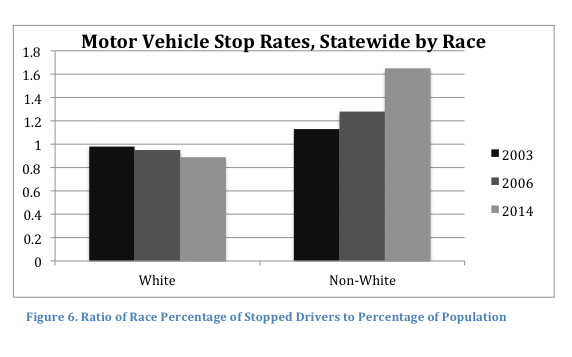 “This report demonstrates what many have known for a long time to be true: life in Rhode Island is different, depending on your skin color,” said Hillary Davis, an ACLU policy associate. “It is our hope that this report will no longer allow these experiences to be discounted and ignored, and that Rhode Island’s leaders will come together to address the problem of racial disparities in Rhode Island before a larger crisis occurs.”
“This report demonstrates what many have known for a long time to be true: life in Rhode Island is different, depending on your skin color,” said Hillary Davis, an ACLU policy associate. “It is our hope that this report will no longer allow these experiences to be discounted and ignored, and that Rhode Island’s leaders will come together to address the problem of racial disparities in Rhode Island before a larger crisis occurs.”
The report calls for six actions to be taken:
- Passage by the General Assembly of legislation limiting the use of out-of-school suspensions and requiring school districts to look seriously at their racial disparities in meting out discipline and coming up with concrete ways to reduce them.
- Passage by the General Assembly of strong, comprehensive racial profiling legislation that seriously confronts racial disparities in traffic stops and searches.
- Passage of legislation – already enacted in a few states – to require the preparation of “racial impact statements” prior to the consideration of bills that would have the effect of increasing the prison population.
- An acknowledgement by state and municipal leaders that racial disparities are a significant problem that demands action.
- A commitment by state and municipal leaders, and particularly law enforcement personnel, to regularly examine policies, practices and procedures which appear to have a disparate impact on racial minorities, and to develop ways to minimize those disparities.
- The annual adoption of specific and measurable plans of action by school districts and law enforcement agencies to address the racial disparities documented in this report and in other data.
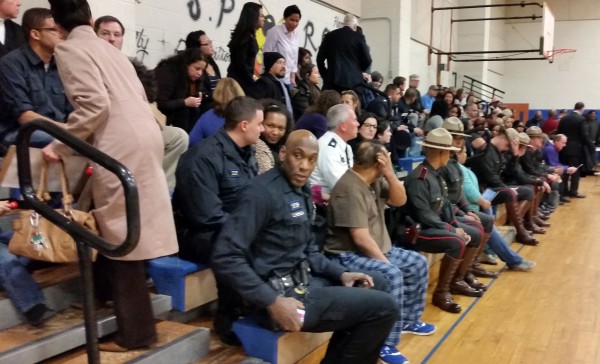 Saying a “deficiency in agency diversity” exists in police departments across Rhode Island, the NAACP Providence Branch has asked the National Association of Black Law Enforcement Officers to review the racial diversity and hiring practices of every police department in Rhode Island.
Saying a “deficiency in agency diversity” exists in police departments across Rhode Island, the NAACP Providence Branch has asked the National Association of Black Law Enforcement Officers to review the racial diversity and hiring practices of every police department in Rhode Island.
“It’s part of making sure police departments are reflective of the communities they serve,” said Jim Vincent, president of the NAACP Providence Chapter. “We’re going to learn the diversity make-up for every police department in Rhode Island, and where that diversity is in terms of hierarchy.”
The study will look at every municipal police department an the state police, said Vincent. It will be ready soon, said Charles P. Wilson of NABLEO.
“After a 3-month process of gathering and analyzing data, we anticipate releasing the formal study sometime next week.” he said in an email. “The training program, entitled ‘Identifying Barriers To Diversity in Law Enforcement-A Community Affair’ will be presented Friday, April 17, 2015 and will be sponsored by NABLEO, the Providence Branch NAACP, and the Roger Williams University School of Continuing Studies.”
A press release from the NAACP Providence Chapter said, “NABLEO will conduct both a survey of all law enforcement agencies to determine the number of minority officers employed, how recruiting information is published and disseminated, and the strength of outreach measures used to notify possible candidates, as well as a training program to be offered to both law enforcement and community members on enhanced methods for recruiting qualified candidates of color.”
In a subsequent interview, Vincent added, “We really don’t have a good feel for the number of African American and Latino and Asian police officers in Rhode Island.” Though, we already know Providence police doesn’t look like the Providence community.
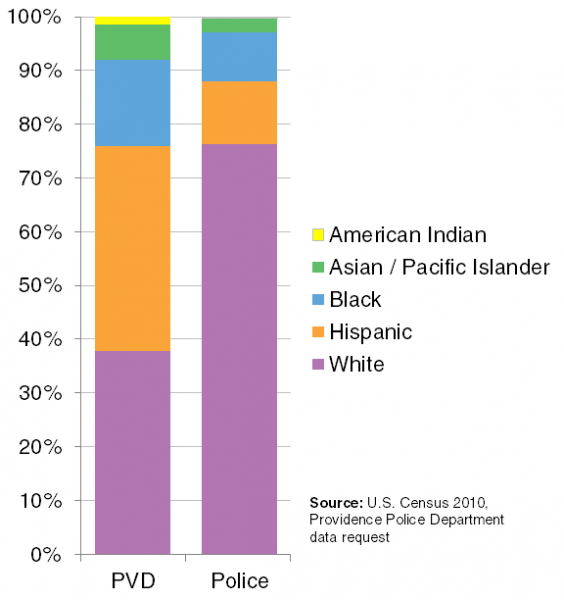
In December, Alex Krogh-Grabbe reported that Providence police is among the least racially representative police department in the nation. He wrote, “the 444-officer Providence Police Department is 76.3 percent White, 11.7 percent Hispanic, 9.0 percent Black, 2.7 percent Asian or Pacific Islander, and 0.2 percent American Indian. According to the 2010 U.S. Census, the city as a whole is 37.8 percent White, 38.3 percent Hispanic, 16.1 percent Black, 6.5 percent Asian or Pacific Islander, and 1.4 percent American Indian.”
In a statement, Providence Public Safety Commissioner Steven Paré told him at the time, “Recruiting a diverse workforce is always a priority. We hired two recruit classes for the PFD and one recruit class for the PPD. It was one of the most diverse classes we’ve had in our history. Our goal is to mirror the community we serve. The challenge is to reach out to the available workforce in the region and recruit the best candidates.”
]]>
Earlier this month more than 100 RISD students and community members gathered at the Canal St. Auditorium for a panel discussion on institutional racism and police violence.
The panelists represented a variety of local organizations. The Providence NAACP was represented by chapter president James Vincent. Panelists (and RISD alumnus) Jess X Chen and Jonathan Key co-founded the Artists Against Police Violence collective. Steven Roberts (a RIC alumnus) helped to create End Police Brutality PVD (which organized the Nov. 25th #IndictAmerica and the Dec. 5th #ThisEndsToday marches). Finally, Yelitsa Jean-Charles (a student) and Normand Gamache (director of public safety) represented RISD.
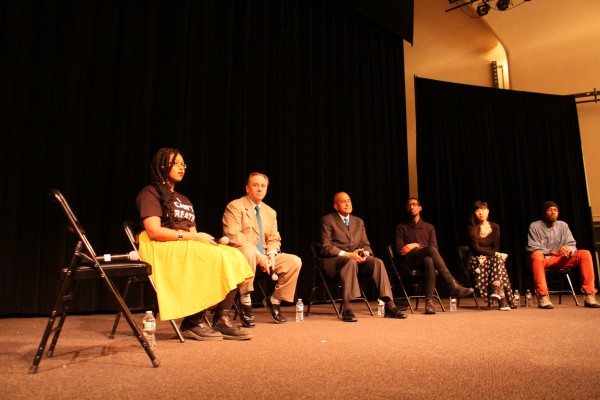
Opening Remarks were presented by RISD Director of Residential Life Kevin Forti and RISD President Rosanne Somerson. Forti’s introduction provided a brief history of Black and White race relations in America, connecting the killings (and subsequent non-indictments) of Michael Brown and Eric Garner with the advances and setbacks faced by the Black community following the end of the Civil Rights movement. Forti contrasted the election of President Barack Obama with Florida’s controversial “Stand Your Ground” laws, the repeal of sections of the Voting Rights Act, and the pronounced economic inequality resulting in high rates of poverty and unemployment in the Black community.
President Somerson recognized the historical importance of artists in defining revolutions and movements. She recognized that visual art has the capability to express concepts that may be difficult to articulate otherwise. Somerson’s remarks reminded the audience that RISD values social justice, and implored the audience to be proactive agents of change.
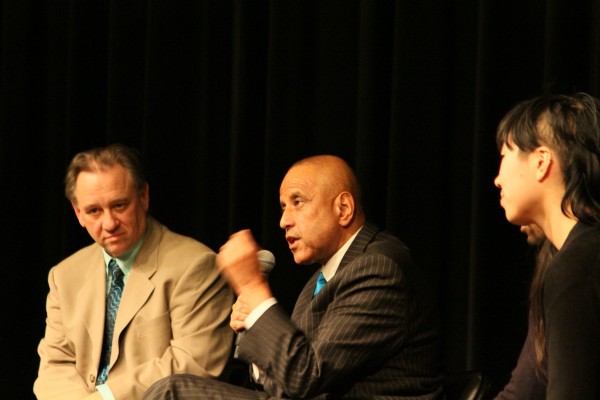
The panel discussion began by relating key issues specific to the Ferguson case with larger social trends. Providence NAACP chapter president James Vincent was the first to answer, describing the racial disparity between the Black community and a mostly White police force. Michael Brown’s representation as a “thug” was used to justify the use of lethal force against an unarmed man. The use of “thug” to describe Brown is particularly dangerous, as it is based upon racial profiling of Black men as dangerous, and is used to justify officer-involved shootings of unarmed suspects. Normand Gamache drew upon his experience in law enforcement to state that the Ferguson police department was not acting properly as it failed to properly engage the community.

Yelitsa Jean-Charles described the lack of accountability for police departments. Part of the lack of accountability includes recognition of implicit biases, which are split-second, subconscious judgments made without conscious input. Implicit racial bias, historically measured by a race-specific version of the Implicit Association Test (IAT), could explain the increased rate of officer-involved shootings of unarmed Black victims. Administration of the IAT to officers could gather more information on implicit biases present in the active duty police force.
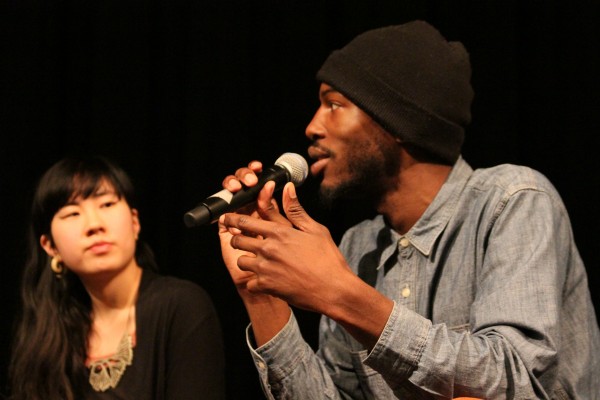
Finally, Steven Roberts described the historical role of police forces in anti-Black violence. Roberts mentioned the Fugitive Slave Act of 1850, which required law enforcement officers across the country to re-capture anyone suspected of being a slave. Captured individuals would be returned to the alleged owner without a jury trial, with a sworn statement of ownership being sufficient proof in some cases. Officers were legally obligated to return any suspected fugitive slaves, setting the ground for a system of racial profiling by law enforcement officers.
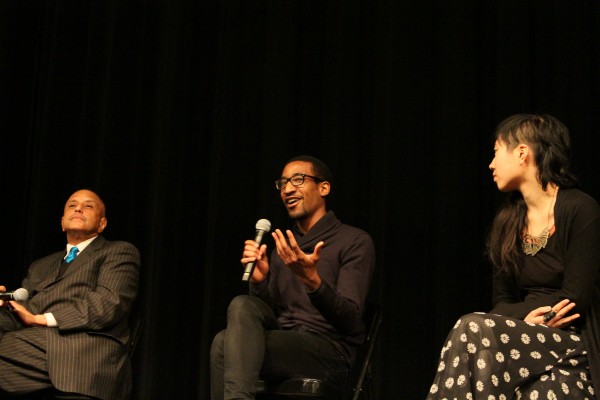
The next set of questions related the topics of institutional racism to the art world, and RISD students’ future role as image-makers. Key and Chen both described the problems they encountered as artists of color. Chen described the difficulties showing works in a White-dominated environment – the majority of her peers could not relate to the experiences that the piece described, and she did not feel comfortable sharing in this environment. Key described how artwork from the perspective of people of color, or artwork that addressed White supremacy was not taken seriously. White art directors would ask him if he could do art that “wasn’t about race”, which devalued his voice as a Black artist.
]]>
Here’s the section on RI:
3. Rhode Island
> Pct. residents black: 6.4%
> Black homeownership rate: 29.4% (10th lowest)
> Black incarceration rate: 1,884 per 100,000 people (11th lowest)
> Black unemployment rate: 16.0% (6th highest)
> Unemployment rate, all people: 9.2% (2nd highest)While typical black households earned 62.3% of the white median household income across the nation, black Rhode Island households made just 52.5% of white households in the state. Such disadvantage can lead to a variety of negative outcomes, including higher poverty and death rates. Last year, there were 234 more deaths per 100,000 people among the black population in Rhode Island than among the white population, nearly the largest gap nationwide. More than 23% of black Rhode Islanders lived in poverty last year, while less than 11% of white residents lived in poverty, a difference of than 12 percentage points, among the larger gaps nationwide. Another particularly detrimental area of inequality is the housing market. While 67.2% of white households in the state were homeowners, only 29.4% of black households were. The 38 percentage points was wider than the gap nationwide of nearly 30 percentage points.
